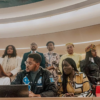By Jaimee Swift, Editor-At-Large
Posted 9:55 PM EST, Sat., Oct. 15, 2016
The Attorney General of the United States Loretta E. Lynch addressed students at Howard University at an event which focused on a topic that has polarized the nation: the contentious relationship between the Black community and law enforcement.
Organized and hosted by the Ronald W. Walters Leadership and Public Policy Center at Howard University, under the leadership of Dr. Elsie Scott, and in partnership with the Office of Community Oriented Policing Services (COPS), the Attorney General served as the keynote speaker, and addressed students, faculty, and staff on a panel discussion on “The Necessity of Diversity in Community Oriented Policing,” Wednesday, October 5.
Panel discussion on police community relations between students and police leaders #SavingBlackLivesTogether pic.twitter.com/nNbuzRUp1M
— Brian Jordan (@QB7to12toCOP1) October 5, 2016
Galvanizing law enforcement officials and student leaders from colleges and universities within the Washington-Baltimore metropolitan areas, the goal of the discussion was to have an open and honest dialogue on diversity and inclusivity in law enforcement and the importance of engaging African-American college students in improving policing within their communities.
Acknowledging the countless shooting deaths of unarmed, Black men, including most recently, Alton Sterling, Philando Castile, Terrence Crutcher, Keith Lamont Scott, and Alfred Olango, and also, recognizing the murders of five police officers in Dallas, Texas, Lynch emphasized that while tensions, anger and sadness on both sides abound, it is imperative that communities come together to heal and learn from one another.
“These events have left all of us with feelings of helplessness, uncertainty and fear. But I strongly believe that we cannot let those feelings divide us,” Lynch said.
“I strongly believe that we must acknowledge our shared pain and rededicate ourselves to repairing the fabric of our society. And if we can muster the strength to come together, I strongly believe that we can emerge from these trying times stronger and more united than ever,” she continued.
Asserting the Department of Justice’s (DOJ) role in its commitment to engaging students of color, Lynch also detailed various initiatives in which the DOJ is implementing to address the need for improved community policing. These strategies include: Maintaining a diverse workforce by hiring more people of color within the law enforcement arenas; dispatching members of the DOJ’s Community Relations Service as on-the-ground peaceful mediators when conflict and tensions arise between law enforcement and communities of color; and also, $3 million in grants to address gender-based discrimination, sexual assault and domestic violence in law enforcement.
“I am proud to say that at the Department of Justice, we are committed to being a part of the solution in a number of ways,” Lynch said. “Our COPS Office has joined with the Walters Center here at Howard to engage more millennials – especially young people of color – in law enforcement.”
“Our Civil Rights Division is working with a number of departments around the country to implement constitutional policing practices and ensure that every citizen’s basic rights are protected,” she said. “In times of tension and conflict, members of our Community Relations Service serve as on-the-ground mediators, helping to forge peaceful and productive resolutions.”
“And through our Office of Justice Programs, we’re promoting and implementing the latest evidence-based strategies for community policing,” she added.
While Lynch provided some initiatives and measures by the DOJ regarding the police state and the Black community, Gabrielle Gray, a second-year doctoral student and president of the Graduate Political Science Association (GPSA), asked the Attorney General what measures the DOJ were to execute, more specifically, in her hometown of Milwaukee, Wisconsin.
“After the killing of Dontre Hamilton in 2014, the DOJ decided to come in to do an investigation of our police department,” said Gray. “[However], that was only after community organizations protested in the city for about a year-and-a-half.”
“But even after they came in and had a large meeting [with] high-level officials, after a while, the dialogue ended,” said Gray. “I asked the question because I wanted to know how there can be sustainable dialogues and support between cities affected by police violence and the DOJ.”
The panel discussion also featured Black law enforcement officials from all over the country, including Deputy Chief Carmen Best of Seattle, Washington; Chief C.J Davis of Durham, North Carolina; and Chief Malik Aziz of Dallas, Texas. Local law enforcement officials from the DMV areas were present as well, including Chief Brian Jordan of Howard University; Lt. Manuel Rivera of Prince George’s Police Department; Commander Marcus Jones of the Montgomery County Police Department, Chief Alfred Durham of Richmond, Virginia; and Major Sabrina Tapp-Harper of Baltimore City.





